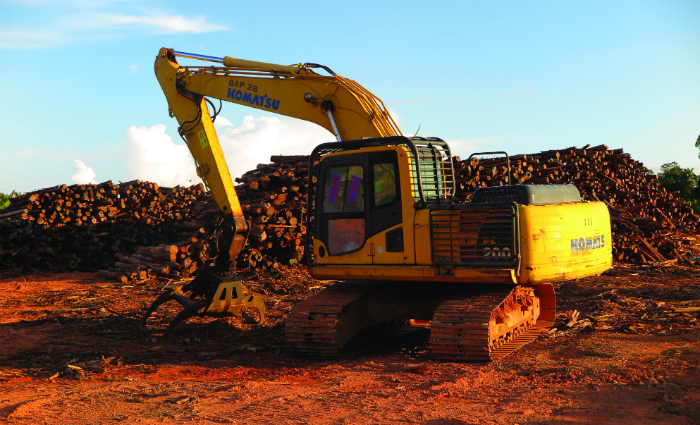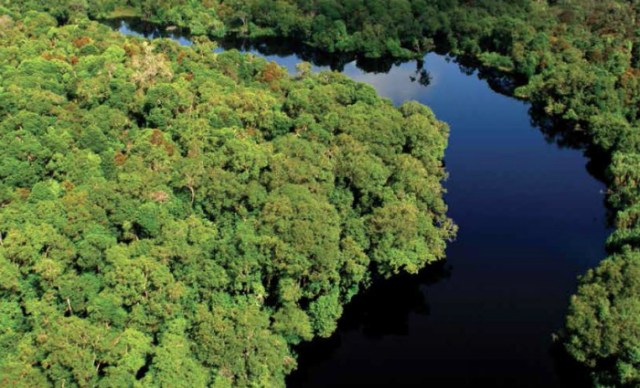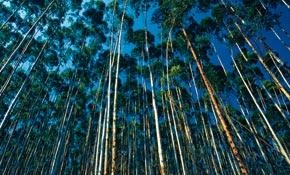
If a paper manufacturer cut down two million hectares of pristine Indonesian rainforest over 30 years and met a decade of public pressure with denial, lawsuits and attacks on its critics’ credibility, then a series of insufficient concessions, before it finally came to the realisation that only by completely abandoning deforestation as a business model could it hope to salvage its reputation before all its customers jumped ship, how could you ever trust it again?
That was the fundamental question facing Asia Pulp & Paper (APP), one of the world’s biggest paper manufacturers, two years ago. Its response was the act of contrition and full-on charm offensive that is the Forest Conservation Policy (FCP). It looks good on paper, an ambitious pledge that includes a commitment to zero deforestation, full transparency of its operations, severe penalties for suppliers found breaking the rules, and later a promise to rehabilitate and protect one million of the hectares it spent years levelling. Yeah right, many thought, a leopard can’t change its spots, especially one that spent its time destroying that leopard’s habitat. This is all just a marketing stunt. Never again.
Scepticism was natural, so APP called in NGO Rainforest Alliance to independently evaluate how it was going at keeping its promises and fixing its mistakes. Rainforest Alliance has a long history of doing formal audits of forestry operations around the world, such as for the hallowed Forest Stewardship Council (FSC) certification APP desperately wants back, and brought that experience to the evaluation.
It was as much a critical step for APP towards convincing the world it is for real as an opportunity for everything to go wrong. The impartial, carefully chosen team spent four months examining more than half of APP’s plantations, interviewing workers and local villagers, and pouring over thousands of documents. Everything up to August 15, 2014 was tested against the four key FCP commitments and ten other forestry-related statements APP made since then. It then wrote a report that was argued over, peer reviewed and published on the two year anniversary of the FCP. The verdict? A cautious thumbs up – APP has made ‘moderate progress’.
Turning off the chainsaws
Arguably the most important promise, to completely stop cutting down natural forest, is the one APP has fulfilled to the letter. Except for two minor breaches in 2013 that APP had already reported, the evaluation team found no evidence that natural forest had been harvested by APP suppliers, and that, as promised, no natural forest wood was used in its mills after August 2013. It has also stopped developing canals and other infrastructure on peatland, and has developed measures to assess its global supply chain to ensure that it never uses wood harvested from natural forests, or uses suppliers involved in land clearing. As part of this supply chain assessment, APP terminated the contract of one supplier in East Kalimantan that refused to stop converting forest to plantations.
High Conservation Value (HCV) and High Carbon Stock (HCS) assessments of APP concessions are not due for release until June, and APP will not be able to build new plantations on areas designated as either. Some concessions have huge areas of these, like the two ProPrint visited which the evaluation team says are 80 per cent HCV.
However, APP is allowed to keep harvesting from existing plantations in HCV or HCS areas, so long as they are well managed and their environmental value is maintained and enhanced. This means the company will not have any fewer trees available for production and will not have to downsize its operations. Recent independent research shows it has enough supply from its existing plantations to meet current and future paper demand without destroying natural forest. APP sustainability managing director Aida Greenbury says the assessments will double the amount of conservation areas in APP concessions to 400,000ha.
Endemic problem or not doing enough?
The biggest problem facing APP’s efforts so far, and one of the biggest criticisms of it, is its inability to prevent third parties from destroying the rainforest even if it hasn’t touched it in two years. The culprits include local villagers, miners, illegal loggers, and neighbouring palm oil and forestry companies that either stray from their boundaries, have overlapping claims, or just do not care. The evaluation team found evidence of recent natural forest clearance in every concession they visited – in many areas villagers had cut down more than 600ha, and in some cases more than 1000ha had been cleared for mining or palm oil.
Evaluators observed two major examples during ProPrint’s visit. The first was an about 15 square kilometre palm oil plantation on the edge of one concession in an area that was marked as moratorium on the map, meaning APP had to leave it alone until it was assessed for HCV or HCS. The team estimated it had been there about a year without anyone knowing about it and the area would now probably never be forest again. The second was an illegal bauxite mine that was shut down by the government in early 2014 and had been ‘rehabilitated’ by the miners on their way out. In reality, the barren, orange landscape had been planted with palm oil and rubber trees by local villagers.
The root causes for these issues are legion. Different levels of government hand out arbitrary pieces of land to different parties without talking to each other, and the lines are difficult to map out on the ground anyway. Then there are illegal loggers sneak in and who do what they want, and villagers who would rather plant lucrative rubber and palm oil to make a living.
Further complicating matters is that some villagers are indigenous and have legal rights, some arrived a few decades ago during government-enabled migration, and others showed up just last week and pretend they have been there for generations. APP is still charged with protecting the rainforest and appears to either be in over its head or not trying very hard.
Numerous open roads allow unrestricted access to the forest, security gates, checkpoints and patrols are broken or understaffed, and illegal loggers are able to openly hawk their wares by the side of the road 200m from the supplier’s camp. Local authorities are unwilling or unable to enforce the law, and some supplier companies say they do not want to jeopardise their relationship with the community by making a report, or fear reprisals.
Rainforest Alliance senior vice president for forestry Richard Donovan identifies this as the biggest problem for APP, and while the company needs help from other parties, it ‘needs to step up and do all it can, and help its suppliers as well’. Greenbury says illegal forest clearing is a problem ‘endemic’ to all of Indonesia. “NGOs said if we turned off the chainsaws the forest would be safe, but that has turned out to be an oversimplification,” she says. “We want to be part of the solution but we ca not do it alone, the problem has its roots in poverty, criminality, and lack of governance and enforcement by authorities.”
Little more action
While APP might have addressed the big issue of deforestation by its suppliers, efforts to take the many other issues covered in the FCP exist only in theoretical policies and processes, and at best have limited implementation. The World Wildlife Fund (WWF), one of the biggest APP sceptics, is scathing in its response to the report. “Not much has changed on the ground – forests continue to disappear, peat soils continue to be drained and social conflicts remain unresolved,” the group’s Indonesian forest commodity leader, Aditya Bayunanda, says. “After two years of assessments and planning, APP needs to shift its focus to action.”
WWF has plenty of ammunition for its position in the report, with the report finding that in many respects APP conservation policies are ‘not consistently mirrored on the ground’ and that communication with suppliers remains an issue despite significant training efforts. “Staff in virtually every concession… told the team that operations within existing plantations and on peatlands have not changed compared to the years prior to the FCP,” the report reads. It should be noted though that WWF itself has its critics, mainly concerning its self-promoting and self-sustaining statements and reports, and its arguably narrow first-world view of developing-world issues.
The peatlands are a significant issue. Acacia, the species of tree preferred by APP in such areas, is thirsty and needs canals to water it. These canals mess with the water table and often end up draining the peatlands, which are almost impossible to repair. How APP plans to deal with this is still theoretical and has barely been implemented. The report also found while APP supplier workers were well paid, given free healthcare, and had good access to training and advancement, the treatment of sub-contractors used by suppliers was ‘substandard’. Many of these workers, who harvest plantations, drive trucks, and plant trees, do not have written contracts, are paid below minimum wage, and spend long periods in areas with no sanitation, clean water, or education for children, and do not have adequate safety equipment.
The progress of APP’s pledge to restore and conserve one million hectares of rainforest, which was not assessed in the report, has also come under fire, with WWF saying “discussions have resulted in little progress, there are no concrete plans on where forests will be restored or conserved, and with what financing”. Other policies like the resolution of hundreds of longstanding conflicts (many more than a decade old), community engagement, transparency, and peatland management are only in early stages of implementation.
Donovan says while there is support for the FCP at a corporate level, implementing policy on the ground is the biggest challenge facing APP. “Many building blocks essential for change, such as policies and standard operating procedures, training and outreach, are in place,” he says. “There is still work to be done in implementing some of those policies and procedures in the field. This is a gap APP must address.”
Is your paper supplier using APP products?
BJ Ball: Stocking a high quality range of uncoated products which forms part of its offset offering
Direct Paper Supplies: Stocks APP as one of its major brands
KW Doggett: Selling a small amount of two or three products and watching situation with interest
Spicers: Will not consider selling any until APP is FSC or PEFC certified
Are we convinced?
While the general reaction to the report from Australian customers has been cautious optimism, most printers and paper merchants are not using it as excuse to rush out and buy APP products again. There are enough negatives in the report to give them pause, and be mindful of WWF’s advice to ‘be alert to the risk of doing business with a company that has not yet eliminated deforestation and peat carbon emissions from its wood supply areas’.
Confidence seems to be returning with every piece of good news, however, and Larry Jackson, managing director of local APP distributor Paper Force, says there has been ‘positive progress’ in the past year and the company is ‘encouraged by the growth’ in that time. “We continue to update our existing customers and the Australian market on what APP is doing, and as a result we have seen an increase in orders and engagement,” he says. Jackson says many customers welcomed the report as it shows APP is on track implementing the FCP.
BJ Ball was the only one of the big three Australian paper merchants to stick with APP through its crisis and has been described as ‘nothing but supportive’ throughout the FCP implementation. The merchant is stocking a ‘high quality range of uncoated products which forms part of its offset offering’.
KW Doggett is also dipping its toes in the water, selling a small amount of two or three APP products. “We have a small position with APP but are watching the situation with interest,” managing director Simon Doggett says. “The report looks encouraging on the surface, but there are some conflicting interpretations.” Some smaller merchants like Direct Paper Supplies have no issues with stocking APP paper, assessing it on a purely commercial basis.
Paperlinx chief executive Andy Preece is taking a harder line and says his company is not stocking APP products in Australia until its operations are certified. “We are encouraged by the report as it shows APP is making progress, but our procurement position remains that we rely on third party verification by the widely recognised FSC and PEFC standards,” he says. Preece’s position has plenty of support in the wider Australian printing industry, with a ProPrint poll showing that after reading the report, half of voters are still waiting for FSC certification before they would buy paper sourced from APP, compared to 29 per cent who are convinced and 21 per cent who will never buy it again.
The widespread insistence for FSC certification is a persistent issue for APP in getting its legitimacy and customers back. The company was not just stripped of it when its environmental irresponsibility was highlighted, it was completely disassociated in 2007 and faces a long, multi-level process towards regaining that seal of approval. The report’s independent assessment is viewed as a critical hurdle and it remains to be seen if the FSC board considers it positive enough to proceed towards reassociation yet, though informal talks are ongoing.
While APP desperately wants its FSC certification back, it realises this will likely take years and for the time being is trying to convince customers to make up their own minds. “Customers need to get away from this focus on labels and look for themselves into what their suppliers are doing,” Greenbury says. “Labelling is not good enough, you have to be stricter – how many times do you hear about a certified brand being caught illegally harvesting in Africa? We are not the only one that was engaged in deforestation in Indonesia, we are just the one that got caught. Companies have to get deeper into the issues and look for themselves.”
Greenbury is of course right, APP is far from the only offender, and its old-foe-turned-collaborator Greenepeace has now turned its guns on Asia Pacific Resources International Limited, (April) another company allegedly knocking over rainforests but that many of the same customers that bailed on APP are still buying from.
But the bottom line is that this is a PR issue for their customers, and many do not want to back them and be wrong. So because APP did get caught, it is now intent on becoming an environmental leader even if it has to go it alone – its customers expect nothing less. The report shows progress, but there is clearly a long way to go in convincing a lot of fence-sitting customers. They are all once bitten, twice shy – and really, can you blame them?
A 525,382 m3 problem
APP was not able to process all the wood it had already cut down pre-FCP before the August 2013 deadline, and a staggering 525,382 cubic metres of now-useless wood is sitting around rotting by the side of the road or on riverbanks in APP concessions. Some 85 per cent of it is in three concessions in Kalimantan, two of which ProPrint visited. The sad, wasteful log piles are more than twice the height of a man and in some places rows of them stretch off into the distance along a road. APP has unsuccessfully tried to sell them off, even just for making pallets, but by now none of it is salvageable and there is no clear solution to the problem.
Eight men and a jungle
The Rainforest Alliance evaluation was a massive undertaking, team leader and renowned Canadian forester Keith Moore says. Over four months, the team visited 21 of APP’s 38 concessions, which make up more than 70 per cent of its 2.6 million hectare working area. The team picked the concessions to get a cross section of vegetation, soil, and mineral types, peatland and non-peatland, and plantations operated by APP or contractors – not for ease of access. Much of it is isolated and difficult to reach, accessible only by boat or four-wheel-drive, and many camps have only basic facilities. On top of that there are bushfires and monsoonal rainstorms to make work difficult. Moore says finding the right people was also difficult – they needed significant Indonesia experience and all but three were locals, and had to be free of conflicts of interest like having worked for APP before. They had a variety of skills, some assessed the environment, others interviewed staff and villagers to identify conflicts and on-ground implementation, and others examined the supply chain. “The good ones are always the busiest,” Moore says. Against the odds, Moore says the field work went smoothly and was completed on schedule. “We made some mistakes and there are some things we could have done differently, but I am confident it went as well as it could have, and in fact better than expected. Fire somehow did not slow us down and we worked around issues. Hopefully any disagreements will be about the report’s content, not the process.”
Comment below to have your say on this story.
If you have a news story or tip-off, get in touch at editorial@sprinter.com.au.
Sign up to the Sprinter newsletter



